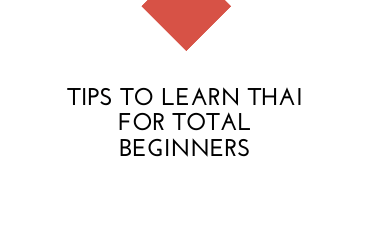In this article, I will give you 7 Tips to learn Thai for total beginners.
I have studied Thai for 3 years now. I consider myself to be a fluent Thai speaker. I can have conversations with anyone, I can watch movies. Sometimes people even think I might be half Thai 😂.
The other day, I was thinking about what advice would I give myself to make my Thai learning experience easier and faster if I can go back in time.
The following are the tips I would give myself and also things I did correct from the beginner as a novice Thai learner.
Hopefully, you can learn from my experience.
Advice for people learning Thai

1. Learn to speak with the correct tone from the start.
Not placing importance on speaking with the correct tone is one of my biggest mistakes when I started learning Thai.
I did learn the script and could read (and actually knew which tones to apply) BUT I would never actually apply the tone when speaking. I would just speak monotone. This came back to bite me on my first trip to Thailand because Thai people had a hard time understanding my Thai.
The worst part is I was so used to speaking without the tone that it took me a long time to get used to speaking with the correct tone.
If you can, I totally recommend you use the correct tone from the start. Check out our tones article if you need help learning the Tones in Thai.
2. Learn to speak using the correct vowel length.
Similar to the first point, another reason people did not understand me clearly was I would speak words without any emphasis on the vowel length.
Vowel length is also very important since so many words can change meaning depending on vowel length.
Check out our article on vowel length in Thai if you are unsure what this means.
3. Learn the Thai Script immediately.
One of the great things about the Thai language is that the language sounds just like it is written. This means that once you learn how to read then you can pronounce all the words. There are no words that can be read in different ways – like in English (example: lead (in pencils) and lead (as in leader)).
Also, knowing how to read will help you pronounce correctly. Instead of relying on transliteration which cannot accurately convey the sounds, learn the script and the sounds the letters and vowels make so you can pronounce correctly.
4. Try to consume authentic Thai material from the start.
Real-life spoken Thai is really different from “language learning” Thai. Thai language uses lots of particles and words you probably won’t learn in a textbook.
If you just rely on language learning material, then you will be surprised when outside of a classroom or language learning settings you won’t understand much.
So I recommend, watching shows with subtitles and consuming authentic content as early as you can.
We have lots of listening material on our website with the transcript. Or if you are more advanced and want to learn using all Thai audio with the transcript check out my audios here.
5. Get a lot of listening practice from the start
Similar to my previous point of consuming authentic material, get a lot of listening practice from the start. You will need to get used to hearing the particles and the tones and there is no better way to do that than by just listening to lots of Thai.
You can watch shows or movies on Netflix with the subtitles, find videos on youtube, or use the resources I mentioned in the previous point.
For more resources for learning Thai, view my post here.
6. italki practice
To put everything I learned into practice, I would book classes on italki. After I knew the basics (how to read, knew a lot of verbs, and question words), I started to take classes 2-3x a week.
I would get practice listening to different accents, I could ask for feedback on my pronunciation, or ask any questions I encountered while studying.
My recommendation is to find one main teacher that you can keep taking classes with for years. That way you can rely on them and they can really measure your progress. However, do sprinkle in some classes with other teachers so that you can test your skills and listen to different accents.
Another recommendation is to let the teacher know what you want to work on before class starts. For example, sometimes, I wanted to really focus on my pronunciation, so I would let the teacher know to correct me if my tone is way off. Other times, I just really wanted conversation practice, so I would just talk about random things with the teacher.
Keep in mind, many Thai teachers are used to listening to foreigners speak but people in Thailand are not. So really let the teacher know if you need help with your tones or pronunciation so that they know to give that area special attention (if that’s what you need help with).
If you want to check out italki, get 10$ for free by signing up with our friend referral link.
7. Don’t get frustrated
My final tip is to remind you to not get frustrated.
With Thai, you have to learn a new script, learn how to pronounce tones, you will have to spend hours practicing, studying, listening but if you keep at it you will make progress.
Sometimes, I look back at my old flashcards and I remember how much I would struggle to remember the words and sentences and now those same flashcards are completely basic to me.
I hope these tips are helpful to you as a beginner learning the Thai language. Remember to be consistent and don’t get frustrated.
